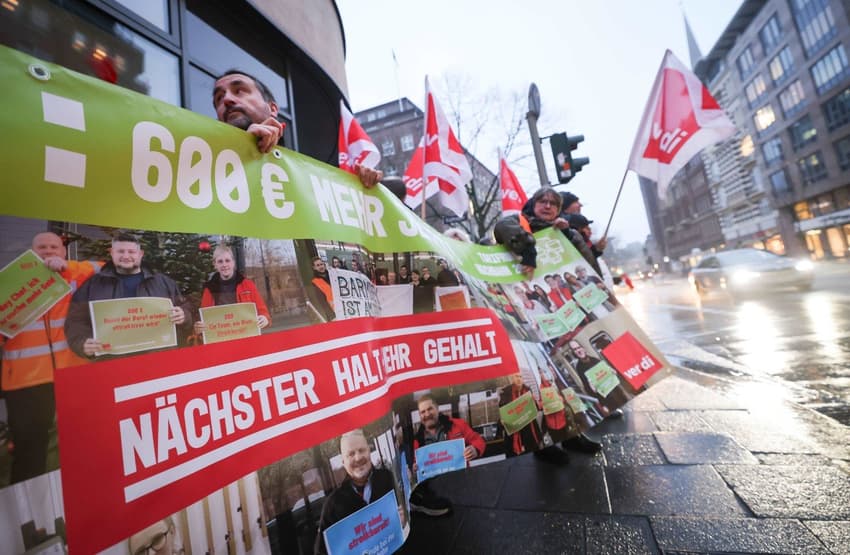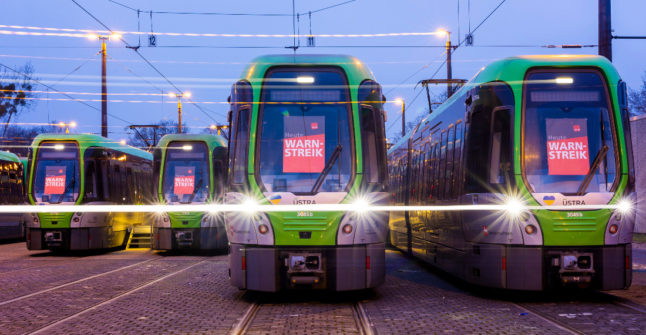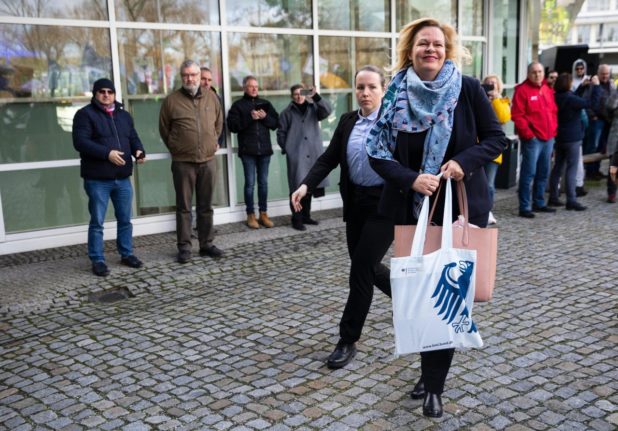What are the chances of unlimited strikes in Germany?

Unions and German officials failed to come to an agreement in their third round of pay negotiations this week. Is this the beginning of a long-term wave of strike action?
This week saw representatives from services union Verdi and civil servants' association DBB back around the negotiating table in yet another round of talks with employers.
The start of the three-days talks coincided with a major warning strike on Monday. In a show of resolve from the unions, Verdi had teamed up with rail union EVG in an unprecedented day of action that paralysed local and national transport services.
But despite the flexing of trade union muscle, both sides had failed to reach an agreement by the time talks concluded on Wednesday evening.
READ ALSO: IN PICTURES: German workers down tools in unprecedented strike action
"The proposals of the public employers would not have ensured that purchasing power would be maintained, especially for the lower and middle income groups," said Verdi president Frank Werneke. "The federal bargaining commission of Verdi has therefore declared the failure of the negotiations."
According to the services union, the employers had made several concessions during the three-day talks in Potsdam. However, a "socially just" pay deal remains the ultimate goal. Here's what could happen next.
Are more talks on the horizon?
Not right now. Instead, Interior Minister Nancy Faeser (SPD) has enlisted the help of the Conciliation Commission, which will assess the arguments on both sides and pitch a potential pay deal by the middle of the April.
This commission will be chaired by two people that each represent a side: former Saxony state premier Georg Milbradt will head up the employers' side and former Bremen State Councillor Hans-Henning Lühr will be putting forward arguments for the unions.
If there's any disagreement, Lühr will have the deciding vote.
Will there be more strikes?
Not in the near future - but there could be if the Conciliation Commission fails to come up with a plan that satisfies the unions.
In the meantime, though, there will be some respite from the travel chaos and closed Kitas as the union have agreed a truce until the end of Easter.
However, it's worth noting that deals pitched by the third-party commission don't always lead to a breakthrough. Back in 1992, unions rejected the mediators' decision and launched ten days of continuous strikes in response.
With Verdi keen to ensure that workers don't suffer any real-terms pay losses during this period of high inflation, their demands could once again be difficult to satisfy - especially since the pay increase would cost the government an estimated €15.4 billion.
That means that the spectre of more industrial action - and even 'unlimited' strikes with no set end date - could potentially come in late April.

Trams in Hanover warn passengers about an upcoming strike. Photo: picture alliance/dpa | Moritz Frankenberg
Where is there still disagreement?
Verdi has been calling for a 10.5 percent pay rise for around 2.5 million public sector workers and a minimum of €500 extra per month.
In return, the employers have said they're willing to grant an eight percent pay rise - or at least €300 extra per month - and a one-off tax-free payment of €3,000.
The union has said it's concerned that lower- and middle-income earners won't get a fair deal and they are also pushing for a 12-month duration for any new agreement.
The employers, meanwhile, want the agreement to last at least 27 months so they don't have to reopen negotiations at this time next year.
READ ALSO: EXPLAINED: Why are there so many strikes in Germany right now?
What are both sides saying about the dispute?
As you can imagine, there's fighting talk on both sides - but there was also the recognition that unions and employers were willing to make concessions to each other.
Speaking after talks had ended on Wednesday, Karin Welge, the chief negotiator for the municipalities, told reporters: "We didn't lose faith until shortly before midnight that we could build the bridge."
On the other hand, Interior Minister Nancy Faeser (SPD) was clearly frustrated by the lack of progress. She pointed out that taxpayers' money would be required for the wage hikes at a time when local governments are especially strapped for cash.

Interior Minister Nancy Faeser (SPD) arrives at negotiations in Potsdam. Photo: picture alliance/dpa | Carsten Koall
She also vented her annoyance that workers could have had a boost to their income in May if the unions had accepted the government's offer.
"I would have thought it would have been in the interests of the workers to have a quick solution now," she said.
Meanwhile, union boss Werneke spoke of "irreconcilable differences" between the two parties. "The public employers have not sufficiently addressed the situation of many workers," he said. "The signal from workers, especially those on lower and middle incomes, is clear: we need real compensation for inflation."
How willing are workers to continue striking?
The signs so far indicate that workers are very willing to down tools in the battle for better pay.
Bus drivers, nurses, kindergarten teachers, rubbish and sewage workers, tram drivers and airport employees have all stages mass walk-outs in the past few months. With the cost of living soaring, many of these view it as a fight for survival.
And so far the public appears to be on their side. Recent surveys have shown overwhelming support for the unions, with a clear majority also supporting the agreement that many public sector workers are underpaid.
This level of support has emboldened the unions. Verdi in particular says it has gained 70,000 new members in the past three months.
It's worth also noting that union boss Frank Werneke is up for re-election in September - so a big win now could serve to shore up his leadership.
READ ALSO: EXPLAINED: How to get compensation for delayed or cancelled trains in Germany
Comments
See Also
This week saw representatives from services union Verdi and civil servants' association DBB back around the negotiating table in yet another round of talks with employers.
The start of the three-days talks coincided with a major warning strike on Monday. In a show of resolve from the unions, Verdi had teamed up with rail union EVG in an unprecedented day of action that paralysed local and national transport services.
But despite the flexing of trade union muscle, both sides had failed to reach an agreement by the time talks concluded on Wednesday evening.
READ ALSO: IN PICTURES: German workers down tools in unprecedented strike action
"The proposals of the public employers would not have ensured that purchasing power would be maintained, especially for the lower and middle income groups," said Verdi president Frank Werneke. "The federal bargaining commission of Verdi has therefore declared the failure of the negotiations."
According to the services union, the employers had made several concessions during the three-day talks in Potsdam. However, a "socially just" pay deal remains the ultimate goal. Here's what could happen next.
Are more talks on the horizon?
Not right now. Instead, Interior Minister Nancy Faeser (SPD) has enlisted the help of the Conciliation Commission, which will assess the arguments on both sides and pitch a potential pay deal by the middle of the April.
This commission will be chaired by two people that each represent a side: former Saxony state premier Georg Milbradt will head up the employers' side and former Bremen State Councillor Hans-Henning Lühr will be putting forward arguments for the unions.
If there's any disagreement, Lühr will have the deciding vote.
Will there be more strikes?
Not in the near future - but there could be if the Conciliation Commission fails to come up with a plan that satisfies the unions.
In the meantime, though, there will be some respite from the travel chaos and closed Kitas as the union have agreed a truce until the end of Easter.
However, it's worth noting that deals pitched by the third-party commission don't always lead to a breakthrough. Back in 1992, unions rejected the mediators' decision and launched ten days of continuous strikes in response.
With Verdi keen to ensure that workers don't suffer any real-terms pay losses during this period of high inflation, their demands could once again be difficult to satisfy - especially since the pay increase would cost the government an estimated €15.4 billion.
That means that the spectre of more industrial action - and even 'unlimited' strikes with no set end date - could potentially come in late April.

Where is there still disagreement?
Verdi has been calling for a 10.5 percent pay rise for around 2.5 million public sector workers and a minimum of €500 extra per month.
In return, the employers have said they're willing to grant an eight percent pay rise - or at least €300 extra per month - and a one-off tax-free payment of €3,000.
The union has said it's concerned that lower- and middle-income earners won't get a fair deal and they are also pushing for a 12-month duration for any new agreement.
The employers, meanwhile, want the agreement to last at least 27 months so they don't have to reopen negotiations at this time next year.
READ ALSO: EXPLAINED: Why are there so many strikes in Germany right now?
What are both sides saying about the dispute?
As you can imagine, there's fighting talk on both sides - but there was also the recognition that unions and employers were willing to make concessions to each other.
Speaking after talks had ended on Wednesday, Karin Welge, the chief negotiator for the municipalities, told reporters: "We didn't lose faith until shortly before midnight that we could build the bridge."
On the other hand, Interior Minister Nancy Faeser (SPD) was clearly frustrated by the lack of progress. She pointed out that taxpayers' money would be required for the wage hikes at a time when local governments are especially strapped for cash.

She also vented her annoyance that workers could have had a boost to their income in May if the unions had accepted the government's offer.
"I would have thought it would have been in the interests of the workers to have a quick solution now," she said.
Meanwhile, union boss Werneke spoke of "irreconcilable differences" between the two parties. "The public employers have not sufficiently addressed the situation of many workers," he said. "The signal from workers, especially those on lower and middle incomes, is clear: we need real compensation for inflation."
How willing are workers to continue striking?
The signs so far indicate that workers are very willing to down tools in the battle for better pay.
Bus drivers, nurses, kindergarten teachers, rubbish and sewage workers, tram drivers and airport employees have all stages mass walk-outs in the past few months. With the cost of living soaring, many of these view it as a fight for survival.
And so far the public appears to be on their side. Recent surveys have shown overwhelming support for the unions, with a clear majority also supporting the agreement that many public sector workers are underpaid.
This level of support has emboldened the unions. Verdi in particular says it has gained 70,000 new members in the past three months.
It's worth also noting that union boss Frank Werneke is up for re-election in September - so a big win now could serve to shore up his leadership.
READ ALSO: EXPLAINED: How to get compensation for delayed or cancelled trains in Germany
Join the conversation in our comments section below. Share your own views and experience and if you have a question or suggestion for our journalists then email us at [email protected].
Please keep comments civil, constructive and on topic – and make sure to read our terms of use before getting involved.
Please log in here to leave a comment.